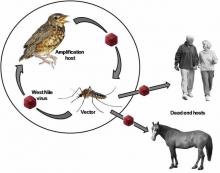
September 15, 2020
Thus far for the calendar year 2020, we have had three cases on West Nile Virus (WNV) confirmed in horses; one in Maricopa County, one in Pinal County, and one in Yavapai County. WNV is primarily transmitted by mosquitoes which are most active at dusk and dawn, and breed in shaded areas with stagnant water. Once a horse or human is infected with WNV virus, there is approximately a 5-15 day incubation period before clinical signs of the disease appear. Clinical signs include fever, lethargy, neurologic signs which can include some or all of the following signs; stumbling, falling, weakness, paralysis, tremors, hyper-reactivity, and loss of control over urinary function, vision or difficulty in swallowing. The course of the disease and the outcome depend on the vaccination status of the animal and individual susceptibility to the disease.
The key to control of WNV is a two-pronged approach:
Firstly, there are a number of safe, clinically efficacious vaccines available on the market. All horses in our reported cases had no recent vaccination history for WNV. Modern WNV vaccines are safe, efficacious, and produce minimal side effects which may include a little muscle soreness in the vaccination site, and lethargy or being “off” for a couple of days. This is no different than what happens to individuals when they get an annual flu vaccine. These side effects are of much less consequence than the repercussions of not vaccinating and having your horse get sick with WNV. WNV infection can be fatal or produce permanent neurologic deficits making your horse unsafe to ride.
The second aspect of controlling WNV is mosquito control as they transmit the disease when biting the animal. Eliminating sources of standing water to prevent breeding grounds for mosquitoes from forming is crucial. From a management standpoint, applying fly sprays and turning your horses out during periods when mosquito activity is minimal during the day (mosquitoes are most active at dusk and dawn and in highly shaded, moist or irrigated areas) is recommended. Fans providing constant airflow through a stable can help reduce the ability of the insects to fly to their targets effectively. Cleanliness in cleaning up manure and debris around the property. Maintain waterers in a clean and operational manner being sure to clean out water troughs on a regular basis is also important.
By following these general guidelines, you can minimize the likelihood of a significant exposure or occurrence of WNV in both your horses. Finally, WNV can affect people through mosquito bites as well, so making sure to eliminate mosquito breeding sources as mentioned above will help protect you and your family.
